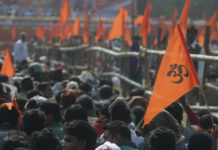British Muslim scholars who recently visited Afghanistan have spoken out about how the mainstream media has completely distorted the reality of what is happening in the country.
Addressing about 250 people at Queen Mary University in London on Saturday, the scholars spoke about the security and peace that now exists in Afghanistan after so many years of war, as well as the Islamic society that is now being created.
The scholars, who were appearing at the launch of the Prosper Afghanistan organisation, also addressed the controversial issue of girls’ education following its suspension at secondary level and above last year.
The ulama who addressed the event were Shaykh Haitham Al Haddad, Shaykh Suliman Gani, Shaykh Hamid Mahmood, Shaykh Ammar al-Madani, Mufti Ismail Satia and Shaykh Abdulkerim Karahanli.
Sheikh Haitham said the level of professionalism of the government leaders he met was “really amazing… They really want to do something for their country and for the Ummah and may Allah help them to do that.”
Mufti Ismail Satia said: “We went to Afghanistan with a very open mind, we did not go siding with anybody. I found Afghan people to be very kind, generous, big-hearted and resilient. But the greater impact it had on me was that it brought back to me the stories of the Sahaba that we read. They reminded me of those who sacrificed for Islam and those who were willing to do anything for Islam. We don’t think people like this exist nowadays but speaking to people over there and the ulama, it made me realise that these people have the same zeal as the Sahaba.”
Shaykh Hamid Mahmood said: “Before leaving for Afghanistan I had never seen anything positive in the mainstream media, but after speaking to members of the Afghan government I realised that they were not just trying to free themselves from physical subjugation and colonialism, but also from financial, economic and intellectual enslavement.”
Subscribe to our newsletter and stay updated on the latest news and updates from around the Muslim world!
And Shaykh Ammar al-Madani said: “The image we have of Afghanistan is totally different to the realities on the ground. The happiness and contentment that the people are feeling is totally different to what is being portrayed through media channels. My request is that any information you seek is through proper channels.”
The delegation of prominent British imams and Muslim scholars visited Afghanistan in July/August and was led by the Human Aid & Advocacy charity in coordination with Prosper Afghanistan.
Prosper Afghanistan also facilitated a series of meetings between the scholars and Afghan officials.

Human Aid & Advocacy said the Muslim leaders travelled to Afghanistan in order to better understand the humanitarian needs of the Afghan people and witness some of the current aid projects established by the charity in the country.
These included an orphanage, a widow’s skills training centre, a vocational skills centre, and an aid delivery to Kapisa province.
Regarding the issue of girls’ education, Shaykh Haitham Al-Haddad told he audience that the issue was being used by the West to demonise Afghanistan. He said that in any society emerging from war there is a hierarchy of needs and security and the economy come first.
“If we are genuinely concerned about Afghanistan the first question should be what is the security situation like? And 2022 was the first year in over 40 years when there was no war whatsoever in the entire area of Afghanistan which is something to be praised.. Secondly, in terms of economy Afghanistan is one of the top ten countries in terms of reducing inflation. And if people are concerned about women they should first ask if women are being harassed?”
Meanwhile, Shaykh Hamd Mahmood said that girls’ education had not been banned per se, but rather “liberal, secular education had been suspended.”
He said the Foreign Minister told him that the Islamic Emirate does not consider girls’ education to be haraam, and that all girls are still being educated at primary level. Moreover, he said that girls could continue schooling until university level if they chose to become medical professionals and teachers or if they studied in a Dar Ul Uloom.

“The minister told us that western secular influences were being driven into the minds of the students who were speaking against the Shari’ah and many vices were creeping in. So the ulama were taken aback and took this matter directly to the amir. He said for 20 years we were united on the battlefield and now when it is time to rebuild the country we cannot tolerate ikhtilaaf (division) and therefore temporary suspension of liberal, secular education took place.”
At the end of the event Faisal Ahmad of Propser Afghanistan addressed the audience. He said there was widespread confusion, even amongst Muslims, about what is happening in Afghanistan, especially when the media constantly speaks about terrorism and women being oppressed.
“Our mission is to enhance public understanding of Afghanistan and to provide reliable information to the UK Muslim community that promotes and supports the development of Afghanistan. We want to see Afghanistan emerge in a post-war era and to be prosperous.”
He added that Prosper Afghanistan would provide information to those who want to help Afghanistan, whether that be through humanitarian assistance, through travel for work or tourism, or through investment or setting up a business there.
“As an Ummah we want to see Afghanistan prosper, we want the Afghan people to live prosperous lives,” he concluded.























